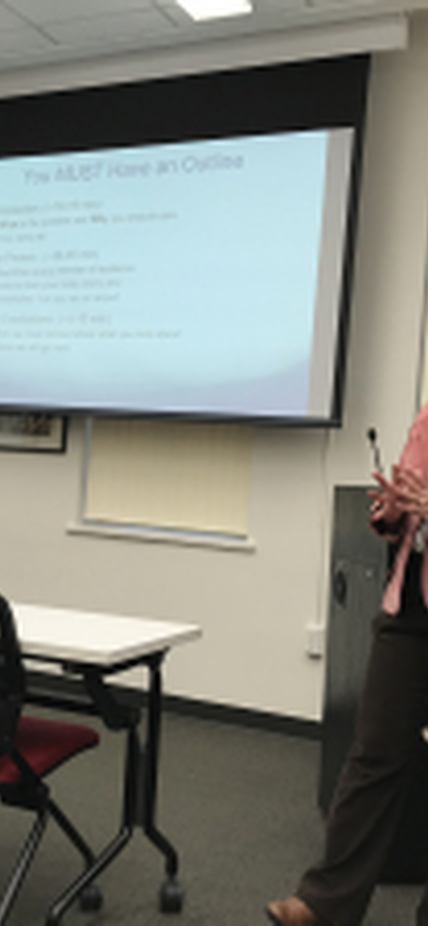Staff Scientist Alycia Weinberger presented a Postdoc Development Workshop on delivering a Good Job Talk. Staff Scientists Anat Shahar, Diana Roman, and Steve Shirey participated in the discussion.
One of the most important tips presented was that you must convince people in different fields of expertise that what you do is important. You must persuade them that you are an expert in your field. And you must believe that you, in fact, are an expert in your field. Stave off imposter syndrome: you would not have gotten to the point of an interview if they did not already think you were.
Key takeaways:
- Whatever field you are in, you need good oral and written communication skills.
- Let your audience know how you fit into their department.
- Practice, practice, practice.
- Know your audience; know your venue.
- Dress for the occasion; a jacket is preferable when using a mic, and nothing you wear should be distracting.
- Ensure that the title of your talk is not off-putting; it should be understandable.
- Create an outline for yourself that breaks down your talk into three important parts: The introduction, the "Protein," and your Conclusions.
- Your Job Talk should be mostly about YOUR work.
- Create good slides with readable font sizes.
- Clearly present your science data.
- Convey your takeaway message on each slide.
- Have backup slides for additional questions.
Check out Alycia Weinberger's list of resources available in her presentation, provided resources, and on her website.
Related Links
- Heidi Newberg's, "The Woman Physicist's Guide to Speaking, original unedited, and possibly offensive version"
- Creating Effective Poster Presentations by Hess, Tosney and Liegel
- How to make presentations friendly to colorblind people by Okabe and Ito
- TedBlog: 10 tips on how to make slides tha communicate your idea
Resources from the BBR Library
-
Advice on Giving Talks
- The craft of scientific presentations : critical steps to succeed and critical errors to avoid / Michael Alley. -- New York : Springer, c2003. Main Library -- -- [T 10.5 .A38 2003]
- Scientific papers and presentations / Martha Davis ; illustrations by Gloria Fry ; cover and frontispiece by Sheri Wheeler Wiltse. -- Rev. ed. -- Burlington, Mass. : Academic Press, c2005. Main Library [T 11 .D32 2005]
- Dazzle 'em with style : the art of oral scientific presentation / Robert R.H. Anholt. -- New York : W.H. Freeman and Co., c1994. Main Library [T 10.5 .A63 1994]
- Advice on Preparing Figures / Graphics
- Preparing scientific illustrations : a guide to better posters, presentations, and publications / Mary Helen Briscoe. -- 2nd ed. -- New York : Springer, c1996. Main Library [T 11.8 .B75 1996]
- Envisioning information / Edward R. Tufte. -- 2nd printing, with revisions. -- Cheshire, Conn. : Graphics Press, 1991, c1990. Main Library [P 93.5 .T84 1991]
- The visual display of quantitative information / Edward R. Tufte. -- Cheshire, -- -- Conn.: Graphics Press, c1983. Main Library -- [QA 276.3 .T83]
- Visual explanations : images and quantities, evidence and narrative / Edward R. Tufte. -- Cheshire, Conn. : Graphics Press, c1997. Main Library [P 93.5 .T85 1997]
- Information graphics : a comprehensive illustrated reference / Robert L. Harris. -- New York : Oxford University Press, 1999. Main Library [P 93.5 H29 1999]
- Visual strategies : a practical guide to graphics for scientists & engineers / Felice C. Frankel & Angela H. DePace. -- New Haven [Conn.] ; London : Yale University Press, c2012. Main Library [P 93.5 .F73 2012]
Downloads and resource links provided by Alycia Weinberger.
